Recent Posts
How do you handle mold at your business
5/2/2024 (Permalink)
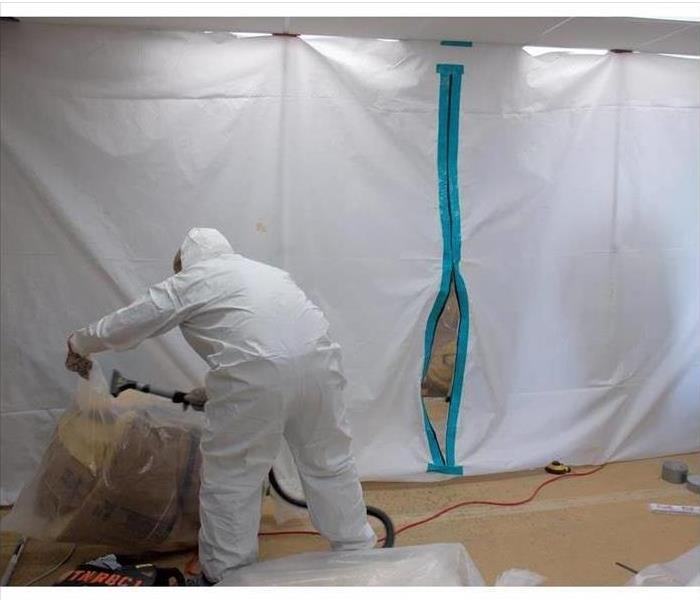 Give SERVPRO Team Lutz at 215-368-4110
Give SERVPRO Team Lutz at 215-368-4110
The mold cleanup process can vary depending on how much or how little mold has spread in a building. It can be valuable to understand ways you can stop the spread of mold in your commercial facility
1. Quick Identification
Mold spores can easily spread throughout a building and identifying a high number of spores in a timely manner is often important. A high number of spores often occurs as a result of water damage, and the sooner the cause of the growth is identified, the sooner cleanup can actually begin. If water is leaking or an area has been flooded, it can be helpful to turn off the water to your building in order to decrease the likelihood of mold spreading to other areas of your building.
2. Containment
Mold containment is a crucial step in the mold cleanup process that mold damage and remediation experts use to prevent mold from moving to other areas in a business. Containment methods involve isolating the areas that are affected by mold and taking various steps to stop the spores from leaving the contained area. In order to bring the number of spores down to an appropriate level, air filters are used. Since moving air makes it much easier for mold to spread, fans are also turned off along with heat and air conditioning.
3. Removing Items Affected by Mold Growth
After mold has been identified and contained, items that have been damaged are removed from the business. Though containment methods and air filters make it less likely that mold will spread, taking items that have been damaged by mold further reduces the likelihood of mold spreading. After damaged items have been removed from the business, professionals will determine whether items can be restored or if they should be replaced.
Knowing ways to keep mold from spreading can make the mold cleanup process cost-efficient and quick. Identifying mold in a timely manner, containing mold and removing items that are moldy can help to prevent mold from spreading throughout your property. If your commercial property is suffering from a mold damage, please consider calling the professionals at SERVPRO Team Lutz 215.368.4110
Clean Your Rain Gutters
5/2/2024 (Permalink)
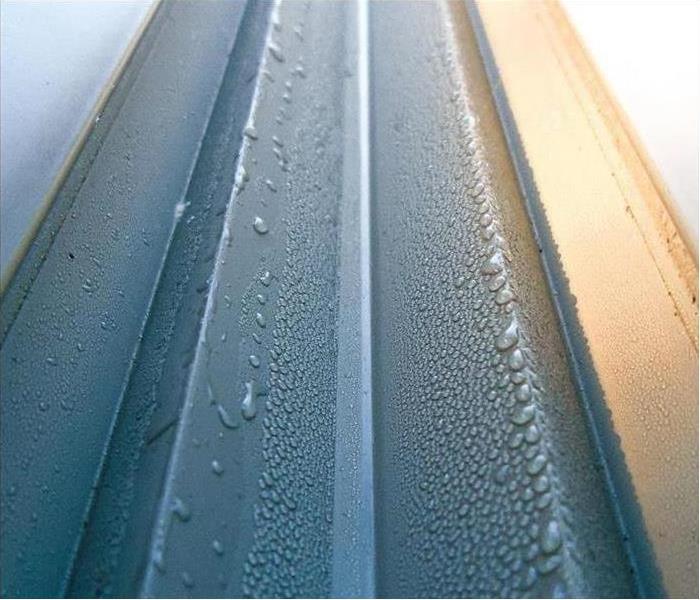 Call SERVPRO Team Lutz, we are here to help!
Call SERVPRO Team Lutz, we are here to help!
Unclogging gutters and rain spouts are an important part of home maintenance in the fall and spring. It’s an easy job to do yourself, but if you are afraid of heights or doubt your ability to get it done, don’t forget your friends here at SERVPRO of Lansdale. We can help you in both cleaning and unclogging your gutters, which help to keep you from dealing with damage from water during the wet months.
You risk experiencing water damage to your roof, basement and crawl space if gutters and rain spouts are not cleaned out regularly. So how often should you clean out your rain gutters? It’s going to be important to take care of this task before the rainy season hits in the spring, summer and into the fall, for sure, so it is probably a good idea to complete this task at least three times a year, ahead of wet and windy weather. Debris will build up in your gutters at those times, preventing water from draining down and out, and if the gutters can’t channel the water when it rains, it ends up pooling and backing up into your walls and attic, or near your foundation and in your basement.
You will want to use step ladders on solid level ground and try to schedule cleaning when the weather has been dry for a few days. This way, the debris, leaves and pine needles won’t be as soaked and will be much easier to remove. Remove larger debris and then follow that up with a powerful hose that washes everything else down towards the downspout. You will also want to clean the gutter filter screens and make sure there are no clogs in your downspout. If these tasks seem like more than you want to handle alone, call us!
Contact us here at SERVPRO Team Lutz for any water damage caused by your rain gutters. Gutter cleaning and unclogging rain spouts is an easy regular home maintenance fix. Do your family a favor by preventing water damage to your home or business with regularly cleaning your rain gutters
Navigating the Waters: What to Know About Water Damages
5/1/2024 (Permalink)
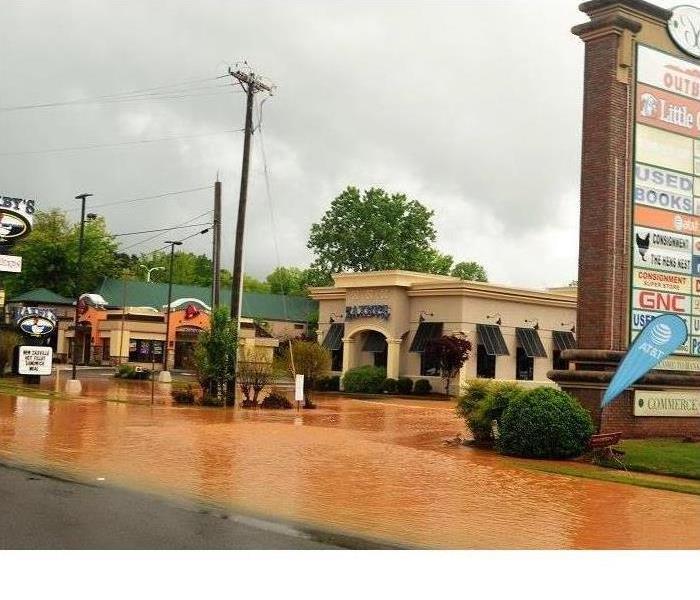 Call us at 215-368-4110!
Call us at 215-368-4110!
Water, essential for life, can also be a source of significant damage when it infiltrates places it shouldn't. From burst pipes to natural disasters, water damage can wreak havoc on homes, businesses, and infrastructure. Understanding the nuances of water damage is crucial for prevention, mitigation, and recovery. In this blog, we'll delve into what you need to know about water damages.
Types of Water Damage
Understanding the types of water damage helps in assessing the severity of the situation and determining appropriate mitigation measures:
Clean Water (Category 1): Water from a clean source like a broken water supply line, faucet, or rainfall. While initially safe, it can become contaminated if left untreated.
Gray Water (Category 2): Slightly contaminated water from sources like dishwashers, washing machines, or clean toilets with urine. Exposure can cause discomfort or sickness.
Black Water (Category 3): Highly contaminated water containing bacteria, sewage, and other toxins from sources like sewage backups, flooding from rivers or streams, or stagnant water. Contact can lead to severe illness or even death.
Immediate Actions After Water Damage
Prompt action is crucial to minimize the impact of water damage:
Ensure Safety: Before entering a water-damaged area, ensure it's safe to do so. Turn off electricity and gas if necessary, and be cautious of structural damage.
Mitigate Further Damage: Stop the water source if possible and remove excess water using pumps, wet-dry vacuums, or towels. Promptly drying affected areas helps prevent mold growth and structural weakening.
Document the Damage: Take photographs or videos of the water damage for insurance claims. Keep records of all communication with insurance companies and restoration professionals.
Restoration and Recovery
Restoring a property after water damage involves several steps:
Assessment: Professional restoration experts assess the extent of the damage and develop a comprehensive restoration plan.
Water Extraction and Drying: Utilizing industrial-grade equipment, water is extracted, and affected areas are thoroughly dried to prevent mold growth and further damage.
Cleanup and Sanitization: Cleaning and disinfecting surfaces and belongings ensure the removal of contaminants and promote a healthy indoor environment.
Repairs and Reconstruction: Structural repairs, including replacing damaged drywall, flooring, or insulation, are conducted to restore the property to its pre-damaged condition.
Prevention Strategies
While some water damage incidents are unavoidable, implementing preventive measures can reduce the risk:
Regular Maintenance: Inspect plumbing systems, appliances, and roofing regularly for leaks or signs of deterioration.
Proper Drainage: Ensure gutters and downspouts are clear of debris to prevent water buildup around the foundation.
Temperature Control: Keep indoor temperatures consistent to prevent pipes from freezing and bursting in cold weather.
Sump Pump Installation: Install a sump pump in basements or areas prone to flooding to mitigate water damage during heavy rainfall.
Water damage can be a devastating experience, but with knowledge, preparedness, and swift action, its impact can be minimized. Understanding the types and causes of water damage, along with implementing preventive measures, is crucial for protecting homes, businesses, and communities against its destructive force. Remember, when it comes to water damage, time is of the essence—acting swiftly can make all the difference in mitigating losses and expediting recovery.
SERVPRO Team Lutz
5/1/2024 (Permalink)
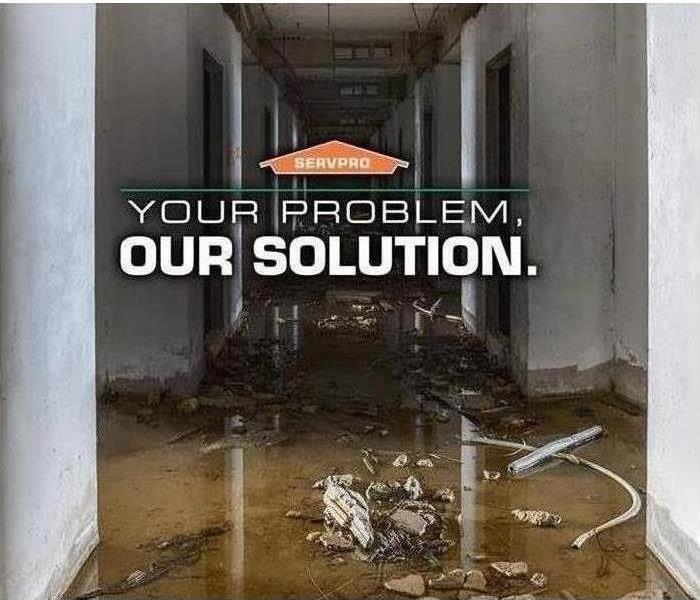 Call us at 215-368-4110, we would love to help!
Call us at 215-368-4110, we would love to help!
An insurance adjuster may be the loneliest and most important person in the property insurance industry. Responsibilities include:
• Guaranteeing company profitability by keeping costs low and minimizing waste
• Creating customer satisfaction with fast response and quality restoration
• Providing vendors with restoration specifications and answers to questions
• Facilitating the entire process with open communications and status updates
When disaster strikes, an insurance adjuster can expect an assignment to a team. The difference is that the numbers are bigger on a team. There are more customers, claims and vendors. Managing many claims on a team can quickly become an overwhelming task.
Insurance Adjusters Prefer Self-Reliant Vendors
It’s easy to imagine that insurance adjusters prefer some vendors over others. However, adjusters don’t choose. The customers do. There are several categories of vendors.
1. Vendors not on the preferred vendor list require the most attention. These vendors have never done work for the insurance company or haven’t done it very often. They may not understand the procedures and guidelines that they must follow. They need training and extra support.
2. Some vendors need more attention than others. The apparent need can happen in several ways. One is that even great vendors may need a bit of micromanaging. Another is that some vendors don’t understand how much self-reliance is acceptable.
3. Good vendors are invisible until they finish.They accept the information from the adjuster, ask questions up front and disappear. The next time the vendor communicates is when the job is complete.
4. The best vendors manage claims in-house.The SERVPRO team manages the insurance claim process using the Claims Information Center. It is the central warehouse for every bit of information that SERVPRO has on the claim. This information includes the original claim, estimates, photos and scanned paperwork. This information is available in print or by email.
The Team Is Ready To Help
The insurance adjuster expects you to select a vendor. When that time comes, know that the SERVPRO of Lansdale, Warminster, and Blue Bell remediation team is always ready to help. Please call us at 215.368.4110.
Why Hiring a Restoration Company is Essential in Times of Crisis
5/1/2024 (Permalink)
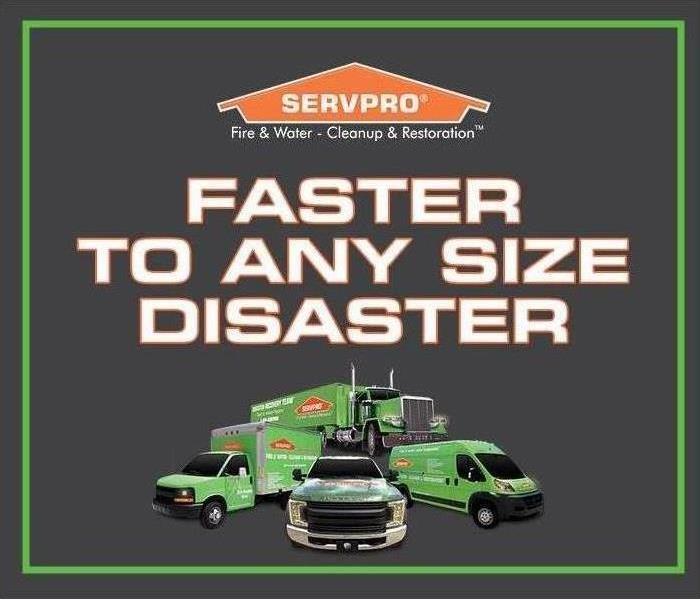 Call us at 215-368-4110, we'd love to help!
Call us at 215-368-4110, we'd love to help!
In times of crisis, such as water damage, fire outbreaks, or mold infestations, the importance of swift and effective action cannot be overstated. While it may be tempting to handle the situation alone, enlisting the expertise of a professional restoration company can make a world of difference. Here’s why:
Expertise and Experience: Restoration companies have trained professionals with the knowledge and experience to handle various types of disasters. They understand the intricacies of water extraction, fire damage cleanup, mold remediation, and more, ensuring that every aspect of the restoration process is handled efficiently and effectively.
Specialized Equipment: Restoration projects often require specialized equipment such as industrial-grade pumps, dehumidifiers, air movers, and thermal imaging cameras. These tools allow restoration experts to quickly assess the extent of the damage and implement appropriate solutions to mitigate further damage and restore the property to its preloss condition.
Fast Response Time: Time is of the essence in disaster situations. A prompt response can help prevent secondary damage, such as mold growth or structural deterioration. Restoration companies typically offer 24/7 emergency services, ensuring that help is just a phone call away whenever disaster strikes.
Comprehensive Services: From initial damage assessment to final cleanup and reconstruction, restoration companies offer comprehensive services to handle every aspect of the restoration process. This means homeowners can have peace of mind knowing that their property is in capable hands from start to finish.
Insurance Assistance: Dealing with insurance claims can be a complex and overwhelming process, especially during a crisis. Restoration companies often have experience working with insurance companies and can help navigate the claims process, ensuring that homeowners receive fair compensation for their losses.
In conclusion, when disaster strikes, hiring a professional restoration company is not just beneficial—it’s essential. Their expertise, specialized equipment, fast response times, comprehensive services, and assistance with insurance claims can make the difference between a minor inconvenience and a major catastrophe. Don’t wait until it’s too late—contact a restoration company today to protect your property and restore peace of mind.
Handling Fire Damage In Your Home
2/20/2024 (Permalink)
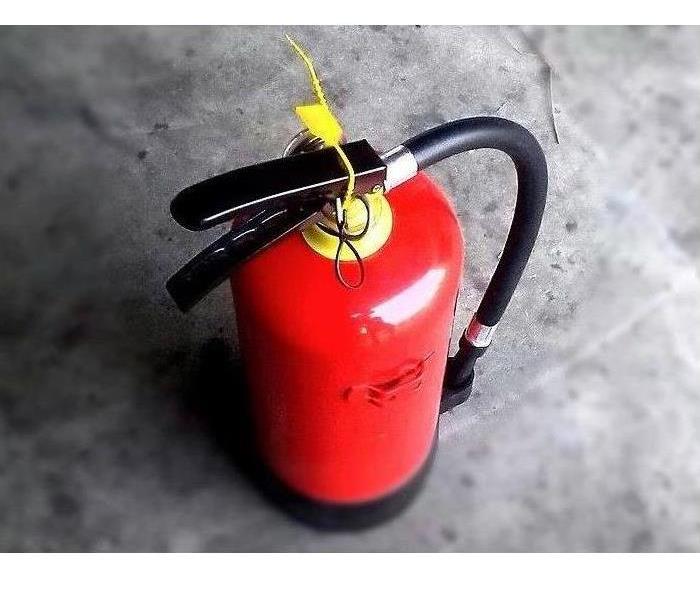 Call SERVPRO Team Lutz today to get help at 215.368.4110!
Call SERVPRO Team Lutz today to get help at 215.368.4110!
With any house fire, you could get hit with the loss of furnishings, electronics, sentimental items, and more. Not only will flames cause devastation, but there is also water from fire hoses and smoke and soot to address. SERVPRO knows how important it is for you to have a plan to get back on your feet. We’re Faster to Any Size Disaster, here for area residents 24/7 for emergency response.
Homeowners may not realize the possible impact on their health when subjected to fire damage. There will be dirty water left with contaminants from charred debris. Soot and smoke residue can have health effects for both humans and pets. You also have to worry about structural elements and instability until fire restoration gets completed.
Some steps to follow that will help you get ahead of the turmoil a fire leaves in its wake include:
- Seek temporary shelter, as entering fire damaged homes before they get deemed safe is dangerous.
- Contact your insurance provider, tell them about the blaze, and get your fire damage claim started.
- Get in touch with SERVPRO so we can mobilize a crew to your door within hours to begin the assessment and inspection.
Once we arrive, we will protect your property with the help of our board-up and tarping services. We cover windows and doors as well as holes in walls or your roof to protect it from the elements, vandals, and vermin.
Fire restoration commences, handling all residual moisture, charred debris removal, and addressing structural elements to return your home to pre-fire condition. Unsalvageable materials get replaced and finished to make it look “Like it never even happened.” Before wrapping up, our Odor Control Technicians (OCT) ensure no lingering odors get left behind to remind you of the fire.
Call us at SERVPRO Team Lutz when you need help with fire damage. Reach us 24/7 at 215.368.4110
How to Prepare Your Home for Storm Flooding
11/1/2023 (Permalink)
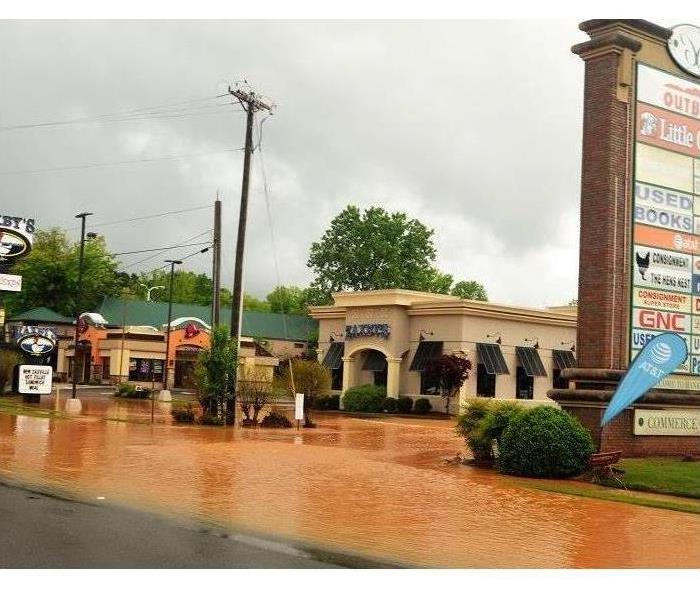 Call SERVPRO Team Lutz today 215-368-4110!
Call SERVPRO Team Lutz today 215-368-4110!
Storm flooding can cause extensive damage to your home and possessions, but with proper preparation and planning, you can significantly reduce the risk and mitigate potential losses. This blog post will guide you through the essential steps to prepare for storm flooding in your home, ensuring your safety and safeguarding your property.
Understand Your Risk: Before taking any action, it's crucial to understand the level of risk your area faces regarding storm flooding. Research local flood maps and consult your local authorities or emergency management agencies to determine the likelihood of flooding in your neighborhood. This information will help you make informed decisions about preparation.
Create an Emergency Kit: Prepare an emergency kit that includes essentials like non-perishable food, clean water, first aid supplies, flashlights, batteries, a portable radio, and important documents. Store this kit in a waterproof container that is easily accessible.
Develop a Family Emergency Plan: Discuss and establish a family emergency plan. Everyone in your household should know what to do in case of flooding, where to meet, and how to contact each other. Assign roles and responsibilities, and practice evacuation procedures.
Elevate Electrical Systems: Electrical systems, such as outlets, circuit breakers, and switches, should be raised above the expected flood level in your area. Consult with an electrician to make necessary adjustments and install Ground Fault Circuit Interrupters (GFCIs) to prevent electrical shocks.
Install Sump Pumps: A sump pump can help prevent water from accumulating in your basement. Ensure it is in good working condition and has a backup power source, such as a battery or generator, in case of power outages.
Waterproof Your Basement: Seal any cracks in your foundation and walls to prevent water from seeping in. Use waterproof paint or coatings on basement walls and floors. Consider elevating valuable items stored in your basement.
Elevate Appliances: If you live in a flood-prone area, elevate your appliances like the washer, dryer, and HVAC systems to prevent water damage. Secure them properly and consult with professionals if needed.
Install Flood Vents: Flood vents can allow water to flow in and out of your home, reducing structural damage. Consult a professional to determine the right type and placement of flood vents for your home.
Consider Flood Insurance: Regular homeowner's insurance typically does not cover flood damage. Investigate and purchase flood insurance through the National Flood Insurance Program (NFIP) or private insurers. Remember that there may be a waiting period before it takes effect.
Secure Outdoor Items: Before a storm, bring in or secure outdoor furniture, grills, and other items that could become projectiles during high winds. Clear gutters and downspouts to ensure proper drainage.
Create a Home Inventory: Compile a list of your possessions, including photos and descriptions. Store this inventory in a safe place, such as a waterproof container or cloud storage. It will be valuable for insurance claims.
Stay Informed: Keep yourself updated with the latest weather forecasts and warnings. Sign up for emergency alerts from local authorities and have a weather radio on hand to receive information during power outages.
Preparing for storm flooding in your home is a proactive step in safeguarding your family and property. By understanding your risk, planning ahead, and implementing preventive measures, you can significantly reduce the impact of flooding and make the recovery process smoother. Remember to stay vigilant and adapt your preparations as needed to address your specific circumstances and location.
SERVPRO Team Lutz is there to help you in your time of need. Call our office at 215.368.4110. There is someone waiting to help you 24/7.
Call SERVPRO, Let the Professionals Help!
11/1/2023 (Permalink)
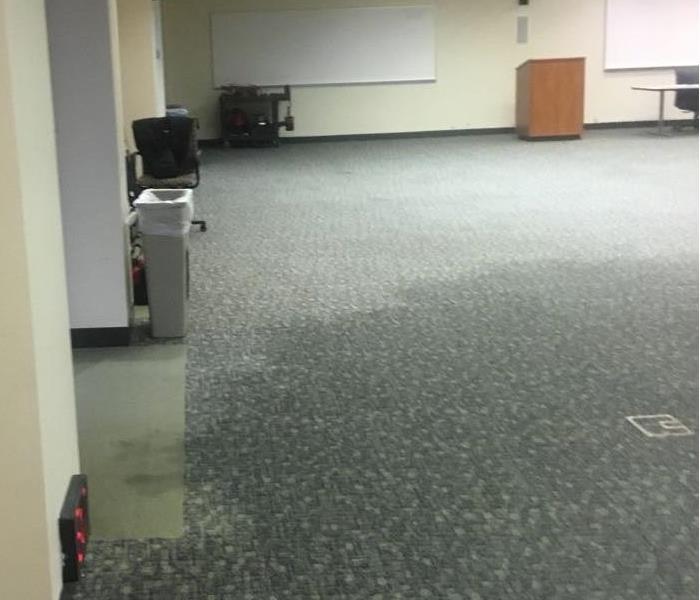 Let us help you minimize the affects a water damage can have on your business. Call us at 215-368-4110!
Let us help you minimize the affects a water damage can have on your business. Call us at 215-368-4110!
Using a professional water restoration company like SERVPRO Team Lutz is often the wisest choice for businesses facing water damage or flooding, as there are several compelling reasons why this approach is superior to attempting the work themselves:
Expertise and Experience: SERVPRO Team Lutz employ professionals with extensive training and experience in dealing with various types of water damage, including flood, sewage backup, and leaks. WE understand the best practices, advanced techniques, and equipment needed to efficiently and effectively mitigate damage.
Speedy Response: Water damage can escalate rapidly, leading to structural damage, mold growth, and other long-term issues if not addressed promptly. We offer 24/7 emergency services and can respond quickly to minimize the damage and reduce business downtime.
Specialized Equipment: SERVPRO invests in state-of-the-art equipment, including industrial-strength pumps, dehumidifiers, air movers, and moisture meters. These tools are essential for effectively removing water, drying affected areas, and preventing mold and secondary damage.
Comprehensive Assessment: SERVPRO's professional restoration experts conduct a thorough assessment of the damage, identifying hidden pockets of moisture that may not be visible to the untrained eye. This ensures that all areas are properly dried and restored, reducing the risk of long-term issues.
Mold Prevention: Water damage often leads to mold growth if not adequately addressed. SERVPRO Team Lutz is skilled in identifying conditions conducive to mold and taking measures to prevent its development, such as proper drying, dehumidification, and mold remediation.
Health and Safety: Handling water damage can expose individuals to health hazards, such as contaminated water, sewage, and mold spores. SERVPRO has the knowledge and equipment to safely manage these risks, protecting the health of both employees and customers.
Insurance Claim Assistance: SERVPRO Team Lutz is experienced in working with insurance companies to facilitate claims and ensure that you receive the compensation you're entitled to. They can document the damage comprehensively, providing the necessary evidence to support your claim.
Minimized Business Interruption: Businesses depend on continuity. Hiring professionals like us can significantly reduce downtime, as they have the resources and expertise to work quickly and efficiently. The sooner your business is back up and running, the less impact there is on your bottom line.
Peace of Mind: Dealing with water damage is a stressful and time-consuming process. Hiring SERVPRO Team Lutz allows business owners and employees to focus on their core tasks and responsibilities, knowing that the experts are handling the restoration work.
Using SERVPRO Team Lutz for commercial water damage is a smart decision. It ensures a thorough and efficient restoration process, minimizes risks, and allows businesses to resume operations as quickly as possible. Ultimately, the cost of hiring professionals is often justified by the savings in time, money, and stress in the long run.
Why your Business Should Have an ERP
11/1/2023 (Permalink)
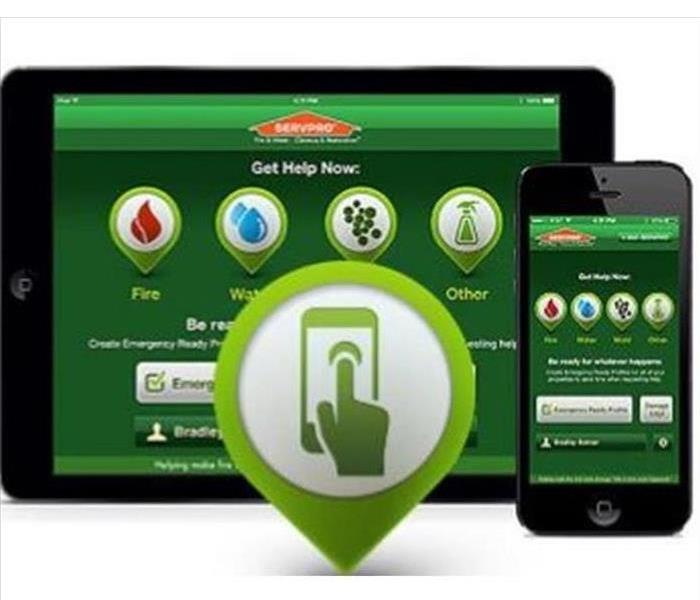 An Emergency Ready Plan can protect your business and employees. We can help you plan!
An Emergency Ready Plan can protect your business and employees. We can help you plan!
Businesses should have an Emergency Ready Plan (ERP) in place for various compelling reasons:
Protecting Lives: The safety and well-being of employees, customers, and visitors are paramount. An ERP provides guidance on how to evacuate, seek shelter, or respond to emergencies, potentially saving lives.
Minimizing Injuries: An ERP helps employees understand how to respond to emergencies safely, reducing the risk of injuries. This can include procedures for handling hazardous materials, fire safety, or severe weather protocols.
Reducing Property Damage: In the event of a disaster or emergency, having a plan in place can minimize damage to physical assets, equipment, and inventory. Quick and effective action can help protect valuable property and minimize financial losses.
Business Continuity: An ERP outlines how to maintain essential operations during and after an emergency. This can include backup power sources, offsite data storage, and communication plans to ensure that the business can continue to function.
Mitigating Financial Losses: Disasters and emergencies can lead to significant financial losses. Having a plan can help a business navigate insurance claims, recover more quickly, and avoid prolonged downtime.
Reputation Management: How a business responds to emergencies can significantly impact its reputation. A well-executed ERP demonstrates responsible management and concern for the community, customers, and employees.
Legal and Regulatory Compliance: Many jurisdictions require businesses to have emergency plans in place, especially if they handle hazardous materials, serve the public, or operate in certain industries. Non-compliance can lead to fines and legal issues.
Improved Employee Morale: Employees feel safer and more valued when their workplace has an ERP. They know their well-being is a priority, which can enhance morale and retention.
Community Responsibility: Being prepared for emergencies is a responsibility not just to the business but also to the community in which it operates. An ERP can help protect not only your interests but also those of your neighbors.
Adaptability: An ERP should be adaptable to various scenarios, from natural disasters to workplace accidents to public health emergencies like pandemics. Being ready for multiple situations ensures that your business can weather different storms.
Peace of Mind: Knowing that your business has a plan in place can provide peace of mind to both you as a business owner and to your employees. In times of crisis, having a well-structured plan to follow can alleviate stress and anxiety.
Insurance Premiums: Having an ERP can lead to potential reductions in insurance premiums, as insurers often see preparedness as a sign of reduced risk.
Having an Emergency Ready Plan is essential for the safety of your employees and customers, the protection of your assets, the continuity of your business, and your legal compliance. It's a proactive step that not only safeguards lives and property but also helps in managing the many risks and challenges that businesses face in an ever-changing world. Let SERVPRO Team Lutz help you with this free of charge. We care about your business and your employees. Call us today at 215-368-4110
What to do after a storm
7/3/2023 (Permalink)
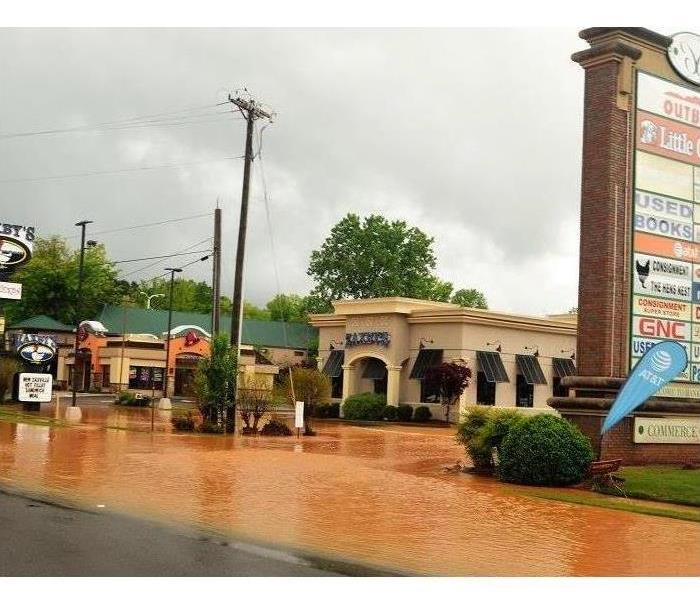 Call SERVPRO Team Lutz today with all your restoration needs at 215.368.4110!!!!
Call SERVPRO Team Lutz today with all your restoration needs at 215.368.4110!!!!
Preparing for SERVPRO Team Lutz after a storm can help streamline the process and ensure a quicker recovery. Here are some of the best ways to prepare:
Contact your insurance company: Notify your insurance provider immediately after the storm to initiate the claims process. Understand your policy coverage and any specific requirements or documentation needed.
Document the damage: Take detailed photographs and videos of the damage caused by the storm. This documentation will serve as evidence for your insurance claim and help the restoration company understand the extent of the damage.
Ensure safety: Safety should be your top priority. Assess your property for any potential hazards, such as downed power lines, gas leaks, or structural damage. If you identify any hazards, evacuate the area and contact the appropriate authorities.
Secure the property: If possible, take steps to secure your property to prevent further damage. Cover broken windows with plastic sheets or boards, tarp roofs to prevent water intrusion, and secure any vulnerable areas.
Gather important documents: Collect important documents like insurance policies, identification, and any relevant contact information. Keep these documents in a safe, easily accessible place, so you can provide them to the restoration company or your insurance company when needed.
Make a list of damaged items: Create an inventory of damaged items, including their approximate value, make, model, and age. This will help during the claims process and ensure you receive adequate compensation for your losses.
Take preventive measures: Before the storm, consider taking preventive measures such as trimming trees near your property, reinforcing windows, and securing outdoor furniture and equipment. These precautions can minimize potential damage.
Communicate with SERVPRO Team Lutz: Establish clear communication. Provide us necessary information, including insurance details, claim numbers, and preferred points of contact. Ensure we are aware of any specific requirements or concerns you may have.
Follow safety guidelines: During the restoration process, adhere to all safety guidelines provided by the restoration company. This may include staying out of certain areas, wearing protective gear, or temporarily relocating while work is being done.
Remember, every storm situation is unique, so it's crucial to consult with the professionals of SERVPRO Team Lutz and follow their guidance throughout the restoration process.






 24/7 Emergency Service
24/7 Emergency Service








